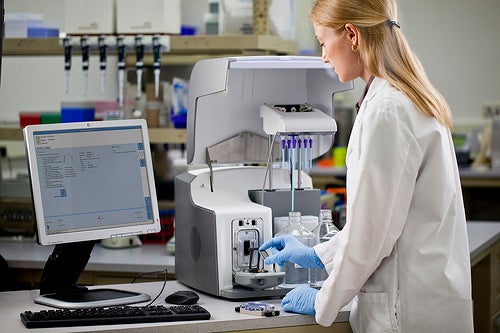Roche Supports the Smithsonian's National Zoo with Next-Generation Sequencing Instrument for Animal Conservation Research
Roche and the Smithsonian Conservation Biology Institute in Washington, DC announced today a collaboration agreement to use Roche's GS Junior benchtop sequencing system for research in SCBI's Center for Conservation and Evolutionary Genetics. SCBI's state-of-the-art genetics laboratory, based at the National Zoo in Washington, DC, will house the next-generation sequencing instrument and will use its deep DNA sequencing powers for a variety of research projects in areas of animal disease resistance, population genetics and molecular ecology.
The Smithsonian Conservation Biology Institute plays a key role in the Smithsonian's global efforts to understand and conserve species and train future generations of conservationists, while specializing in areas of animal ecology, management, health and breeding. Researchers at SCBI plan to use the GS Junior System's DNA sequencing technology to gain deeper insight into the genetics of dangerous pathogens that threaten animal species. Specific projects include:
- Sequencing strains of the deadlyamphibian chytrid fungus that has devastated amphibian populationsworldwide.
- Sequencing highly pathogenicstrains of the elephant endotheliotropic herpes virus (EEHV1).
- Sequencing invasive avianmalaria strains that are devastating most species of native Hawaiianbirds.
The power of next-generation sequencing is remarkable, said Rob Fleischer, head of SCBI's Center for Conservation and Evolutionary Genetics. We are thrilled to work with Roche to bring the GS Junior System into our laboratory. The system is perfectly sized for our research and the long read lengths are critical to our particular areas of focus in pathogen detection and viral/bacterial comparative genomics.
We are honored to support the Smithsonian Institution and the National Zoo's animal conservation projects, which are vital to the future health of our planet, said Thomas Schinecker, President of 454 Life Sciences, a Roche Company. This collaboration demonstrates the tremendous potential of our sequencing technology to broaden understanding of all species on earth - from humans to plants and animals.
The Smithsonian Conservation Biology Institute plays a key role in the Smithsonian's global efforts to understand and conserve species and train future generations of conservationists. Headquartered in Front Royal, Va., SCBI facilitates and promotes research programs based at Front Royal, the National Zoo in Washington, D.C., and at field research stations and training sites worldwide.
